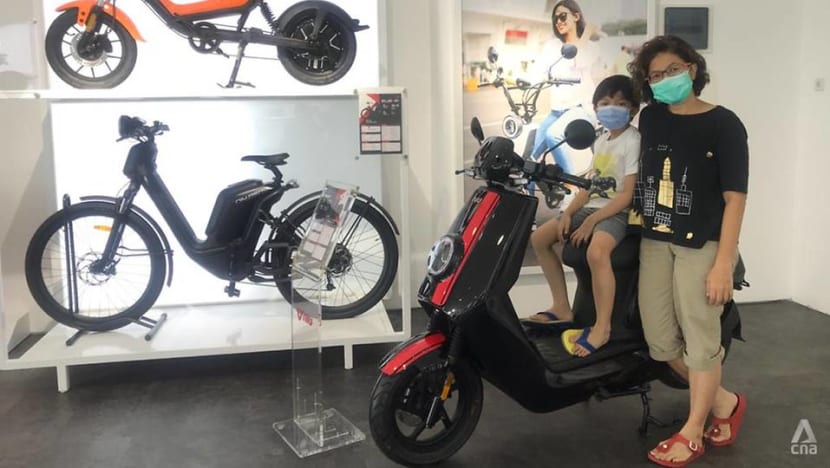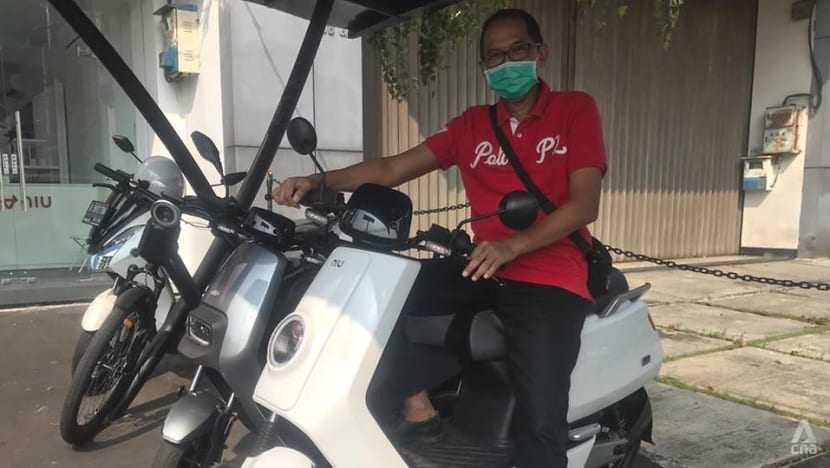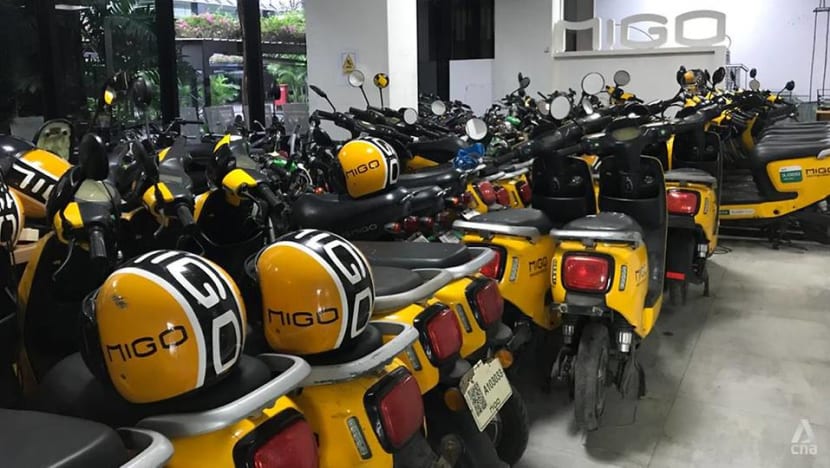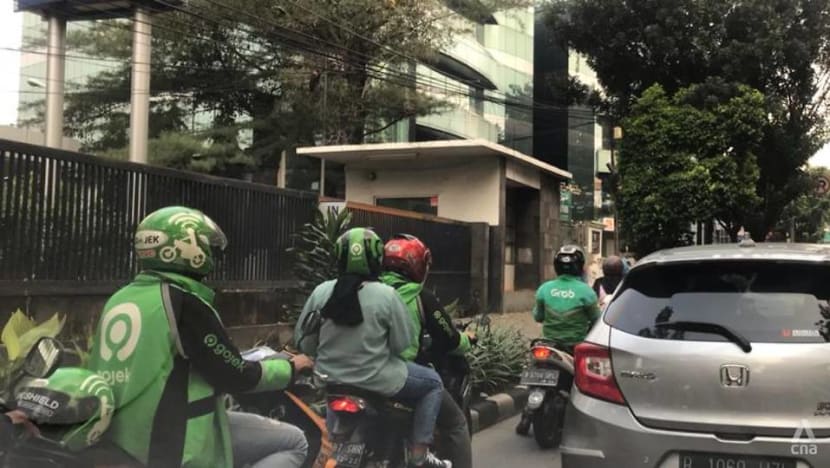Electric motorbikes could alleviate Indonesia's congestion and pollution, but experts cite challenges

Mdm Tjut Devi believes now is the era of electric vehicles. (Photo: Kiki Siregar)
JAKARTA: Indonesian entrepreneur Dion was examining a new white motorbike that he just took for a test drive.
“It was really good,” he told CNA of his experience riding the China-made electric vehicle (EV) that was being sold at a showroom in South Jakarta.
“First of all, it wasn’t noisy. And the engine was powerful right from the start. That’s the difference between electric motorbikes and motorbikes using fuel,” he said, as he mulled over whether to commit to the purchase.
Dion, who only wanted to be known by his first name, is among those in Indonesia who are considering switching to electric motorbikes, as a more environmentally friendly lifestyle choice and possible solution to the country's notorious traffic congestion and pollution.
However, experts interviewed by CNA note that there are challenges in EV adoption despite the potential benefits.

There are signs that EV adoption may be gaining ground in Indonesia. A report by global management consulting firm McKinsey & Company published said that Indonesia has one of the world’s highest-potential markets for adoption of EVs, especially for motorbikes.
Indonesia could be a sizeable market by 2030, the report said, due to its large domestic market. There could be 6.4 million two-wheeler sales by 2030, 1.9 million of which could be electronic two-wheelers. For four-wheelers, 240,000 of the 1.5 million estimated sales by 2030 could be EVs, it added.
Ride-hailing app Gojek recently announced that it plans to make every car and motorcycle on its platform an EV by 2030.
The goal was outlined in Gojek’s first sustainability report launched on Apr 30. The report noted that an increase in EV adoption means reduced emissions and improved air quality.
Jakartan Tjut Devi, who has just bought her first electric motorbike, said the environment was among her top considerations.
Speaking to CNA at the same showroom in South Jakarta, she stated that now is the era of EVs. "I don't know whether it is economical or not, but for sure, I want to reduce pollution,” she said.
Mdm Devi works in the renewable energy sector, and has a passion for environmental issues.
She prefers buying a motorbike compared to a car because of its practicality considering Jakarta's traffic congestion. It is easier and faster to navigate around the city with a motorbike, she said.
"I view it from a practical point of view. If I use a car, it's very congested.
"I also think I need the motorbike just for city commuting, such as when I want to go to the mall near my house, or even to the office," she said.
READ: In gridlocked Jakarta, Indonesia's first airport helicopter service targets niche market
COST OF OWNERSHIP EXPECTED TO FALL
For average Indonesian vehicle owners, four-wheeled EVs may be out of reach as it is priced around 650 million rupiah (US$45,773), compared to internal combustion engine cars which are usually available at about 200 million rupiah.
As for motorbikes, those powered by petrol can be purchased for around 10 million rupiah upwards, while the electric-powered ones usually cost twice as much.
With more China-made electric bikes entering the Indonesian market, the price difference between electric and petrol two-wheelers is expected to narrow, said observers.
Plans for Indonesia to become a hub for EV battery production might also mean cheaper vehicles in the long run.

According to the McKinsey report, the cost of owning an electric motorbike is soon expected to drop below that of its traditional counterpart.
“A lower total cost of ownership will be the primary driver for a shift toward electric two-wheelers. This could help it become cost-competitive with internal combustion engine two-wheelers by 2022.
"These lower economics for electric two-wheelers will be attractive to consumers both in big cities and outside big cities,” said Mr Thomas Hansmann, a partner with McKinsey & Company in Indonesia.
Mr Hansmann said that the primary driver in reducing the total cost of ownership is a reduction in battery cost through technological improvement. "As more electric vehicles are manufactured, electric two-wheelers may achieve cost reduction through economies of scale in manufacturing," he explained.
He added that electric motorbikes do not require separate power infrastructure, unlike electric cars.
“Batteries today cover a range of 40km to 70km, while most consumers drive less than 40km a day. As such, we anticipate most of the consumers to charge their electric two-wheelers at home,” Mr Hansmann added.
READ: Cycling fever hits as Jakarta residents avoid congestion, public transport
Mr Jonathan Simon, salesperson of Niu in the South Jakarta showroom noted that practicality and its relatively affordable price are the key selling points of electric motorbikes.
Niu-branded motorbikes, which are made in China, for example, are available at around 23 million rupiah and can be charged anywhere as long as there is enough power from the household electric socket.
“Every house has different power units …But motorbikes don’t take up a lot of power,” he claimed, adding that Niu's motorbikes consume between 700 watt and 1,500 watt.
CHALLENGES TO EV ADOPTION
Despite the potential benefits of higher EV adoption in Indonesia, human behaviour, national fuel mix and vehicle pricing are among the factors that could affect whether such vehicles will become mainstream.
According to Mr Bima Adhiputranto, operational manager of Motolife Internusa, a distributor in Jakarta of electric vehicles and internal combustion engine vehicles, the biggest challenge in EV adoption is people's behaviour.
“The challenge is in educating the public. How to convince them to switch over to electric vehicles if they have been used to tank up their vehicles … In our view, electric vehicles have more advantages because they don’t need maintenance. You don’t need to change the oil. All you need is to charge and then off you go."
He added: "But what you need to change is your habit. If they are used to filling their vehicles with fuel once or twice a week, now they may need to recharge every day … so they need to adapt,” said Mr Adhiputranto.
READ: Indonesia is poised for EV riches as Tesla circles, but a nickel rush could hurt the environment
Jakarta-based transport analyst Darmaningtyas, who goes by one name, is less enthusiastic about the potential of EVs in Indonesia.
“If the electricity is still derived from coal-fired power plants, actually it is just shifting over the problem. Because the coal reserve is limited, coal also generates dangerous waste, and it also disrupts the environment from the mining,” he said, referring to how Indonesia’s energy mix is dominated by fossil fuel.
“That’s why I’m not euphoric regarding electric vehicles as long as our electricity is still being produced by coal. Whether they are two-wheelers or four-wheelers, they can only be regarded as a solution to environmental problems if the electricity is from water, which we have abundant of in Indonesia such as seawater or from dams,” he added.

READ: Declassifying coal power plant ash as hazardous waste sparks concern in Indonesia
Commenting on Gojek's EV adoption plan, Mr Darmaningtyas, who works at non-governmental organisation (NGO) Instran, which focuses on transport issues, said the price of electric motorbikes will be an important factor.
If the price remains at around 20 million rupiah, riders would stick with their conventional bikes, he said.
Unless the company has certain regulations which would allow riders to take on instalment payments to buy electric vehicles, the plan may not work, he added.
For now, Dion, who has not decided whether to buy an electric bike, said he wants to study everything thoroughly.
“I am interested ... But I am still considering everything, including the resale price," he said.












